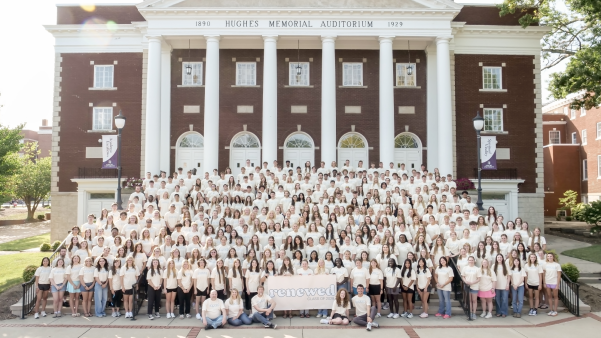Read Luke 1:39-45
I SAT ON THE COUCH AND WEPT, still dressed in stiff business casual. I had returned home from the classroom with the realization like a cold stone in my gut—I was not healthy enough to be a teacher. I could not finish my master’s program. I could not spend the hours or energy required to do this one thing I thought God had been leading me toward my whole life. This garden I planted and tended since my childhood, just now springing up, was to die.
So, I gave it up. There was nothing to be done but pray that God would do something beautiful in the uprootedness of it all. I stood in the middle of dead dreams, unsure how—or what—to replant.
While in vastly different times and with different implications, I find a resonance in the story of Jesus’ lineage and the way Elizabeth made her home in the wreckage of her uprooted dream. Her pain of a lost dream was compounded by the dishonor that barrenness brought in the ancient Near East. But in a moment, God reversed her story. “The Lord has done this for me,” she proclaimed. “In these days he has shown his favor and taken away my disgrace among the people” (Luke 1:25). Here was hope, growing soft and green in the darkness of the soil, as surprising as spring. God specializes in epic reversals. Elizabeth would bear not just any son in her old age—she was carrying the child who would prepare the way for the Messiah.
I was still on that couch with crumpled tissues clenched in trembling hands when a wise man, now my husband, helped me sort out what was still growing in the garden: those seeds planted by the hand of God that I had missed. Years later, I’m harvesting different fruit than I thought I would—but it’s better fruit. I consider this my own mini-reversal. God took a dream I thought had been rendered useless and flipped it into a reality of teaching through writing and discipleship, things that fit the contours of my heart better than a classroom could. I’ve made my home in this garden, and I can’t imagine it any other way.
God’s reversals fill the pages of Scripture. Consider the birth of Isaac to an elderly and once seemingly barren Abram and Sarai, Joseph’s rise from slave to ruler, or the way Haman’s plan to destroy the Jews was foiled by two Jews God lifted to positions of power in their place of exile. These stories speak to the way God delights in flipping situations upside down, bringing salvation in the most surprising ways.
All of these foreshadow the most surprising reversal of all. God was born as a baby to usher in the upside-down kingdom of heaven where the last are first. He defeated death and rose from his garden grave as the firstborn in the resurrection, purchasing our eternal life.
This ultimate reversal that flipped the principalities and powers upside down is what Elizabeth’s reversal first points to. Having a child meant that she would no longer be called barren, undoing her earthly shame. But the baby Mary carried would undo Elizabeth’s eternal shame. When Mary’s greeting reached Elizabeth’s ears, “the baby leaped inside her, and Elizabeth was filled with the Holy Spirit. Then she exclaimed with a loud cry, ‘Blessed are you among women, and your child will be blessed!’” (Luke 1:41–42, CSB). Elizabeth’s awe of God swelled as the Savior of the world, still in a womb, came through her door in the swollen belly of a virgin. The baby in Elizabeth’s womb leaped, like hope springing up, because Mary’s baby had arrived to save us.
This God is leading us home to the new heaven and earth, a beautiful garden city where death is no more. And until then, he is planting new life in you and me. Our God gives us something better than our earthly dreams. He gives us himself.
Alicia Hamilton authors Bible studies and disciples college students in New Hampshire.
This article is part of A Time for Wonder, a 4-week devotional to help individuals, small groups, and families journey through the 2024 Advent season. Learn more about this special issue that can be used Advent, or any time of year at http://orderct.com/advent.










